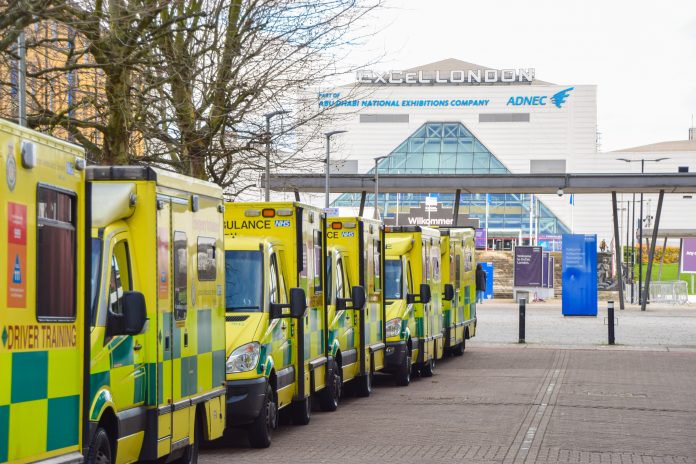Professor Sultan Mahmud, Director of Healthcare for BT’s Enterprise unit, discusses how BT is redefining its healthcare ambitions through co-creating NHS-first solutions with its vanguard partners
A survey of healthcare leaders has underlined the speed at which the NHS adopted digital solutions during the COVID-19 pandemic; but also identified some of the barriers to further progress.
The digital transformation of healthcare is not a new concept but was given added urgency by the corona-virus pandemic. Like so many others, I was both awed and humbled by the speed at which NHS organisations shifted to remote working, virtual clinics and digital consultations, in response to exceptional demand.
Now, the challenge is to build on that wave of innovation. This winter, we are seeing ambulances queuing outside hospitals that have wards full of patients they cannot discharge. Some of the problems faced by these patients could potentially be handled in the community, if the right social and remote care was available.
Integrated care systems (ICSs) will look to tackle these challenges by joining the system together and introducing new patient pathways that will be underpinned, where appropriate, with digitally enabled services.
Before joining BT, I had a 20-plus year career in the NHS, and that gave me a huge passion for integrated care. The development of ICSs is incredibly exciting and very much needed. However, as new entities, they will have a bedding in process; and to deliver on their promise, technology is going to be critical.
We know that healthcare leaders recognise this. Earlier this year, BT worked with iGov Survey to capture the views of individuals working across central and commissioning bodies, as well as acute, community and ambulance trusts.
No fewer than 86% of participants said they had ‘accelerated the timeframe in which we are carrying out our digital transformation.’ And they identified the continued demand for remote access and care, high demand at a time of operational and budget constraints, and ‘changing demographics and the impact of population health’ as continued drivers for change.
Building strong foundations on modern, sophisticated networks
Despite the appetite for digital solutions, the survey also identified multiple hurdles to further digital transformation. These included a lack of funding and the need to get the right network, wi-fi and mobile infrastructure in place. Around 60% of respondents said network ‘not spots’ were ‘incredibly challenging’ or ‘challenging’ to mobile care work.
This is where we, at BT, come in. We are building on our history as a trusted partner to the NHS to co-create the health and social care services of the future. The first step is to make sure health and social care has the sophisticated, modern infrastructure it needs to support services that will help to meet their strategic goals.
BT is investing £25 billion into its network over the next five years and no UK tech company invests more in R&D than us. Investment means that our network reaches further than any other UK network and is able to constantly analyse and prioritise traffic to improve security and optimise access for critical applications.
At the same time, our wi-fi and mobile infrastructure can eliminate those ‘not spots’ and make sure health and care professionals can operate wherever patients and citizens need them.
Tackling interoperability and cultural challenges
Survey participants also highlighted issues with the IT systems that operate over these networks. In particular, they raised the issue of ‘interoperability,’ or getting different systems to ‘talk to’ each other. Around 40% of respondents said the ‘inability to share information with other health providers’ was ‘challenging’ or ‘incredibly challenging.’
Here at BT, we are looking to make a major contribution in this space, by building customer-driven solutions that put vital information into the hands of health and care professionals in time to make a difference to patients.
My vision is to support the delivery of anticipatory care that might prevent an ambulance journey for a frail, elderly person by alerting the 999 service to, for example, a respiratory condition that could be handled by a district nurse. Or to help to avoid a delayed discharge by delivering effective social and remote care services to enable that patient to return to the comfort of their own home.
We are already co-creating solutions with a number of our NHS vanguard partners, through projects such as the remote diagnostics kit we developed in partnership with University Hospital Birmingham NHS Foundation Trust. And the number of pioneering partners that we work with is growing as we continue to explore and prove new connected healthcare solutions.
Customer co-creation is essential because the third message that came through clearly in our survey was that some of the biggest challenges to digital transformation are not technical, but cultural.
Around 60% of participants identified ‘resistance to change’ as a challenge, while digital literacy and digital inequality were also mentioned as hurdles. We can address those challenges if we build solutions in partnership with organisations, professionals, patients and their families.
To enhance our ability to do this, we have recently appointed seven NHS clinicians to form BT’s clinical board. As working heroes of the NHS, they will bring unrivalled insight and understanding to ensure that our customer-driven solutions are fully trialled, tested and embedded with feedback from colleagues on the ground.
BT, a trusted partner for the future
BT has been a trusted partner to the NHS since it was founded in 1948 and during the pandemic we accelerated our own digital delivery to the NHS. We were asked to roll-out high-speed connectivity and 1,000 IP phones to the Nightingale Hospital at ExCel London; and we did it in 48 hours.
We delivered high-speed fibre and wi-fi connectivity to more than 180 vaccination centres in England and Wales. And we were a critical partner in delivering the award winning Life Lines project launched by Guys and St Thomas’ and Kings College Hospital NHS foundation trusts to keep patients in touch with their loved ones – even from intensive care.
To continue building on that wave of innovation, we are recalibrating our relationship with healthcare. We have just formed a partnership with The King’s Fund to tap-into the thinking of NHS leaders and to spread the news of what works.
We are taking the lessons of our survey and working in partnership with our vanguard NHS trusts to co-create solutions that will keep up the momentum on digital transformation, help them to tackle current demand, and ultimately support them to be ready for whatever comes next.

Please note: This is a commercial profile
© 2019. This work is licensed under CC-BY-NC-ND.











